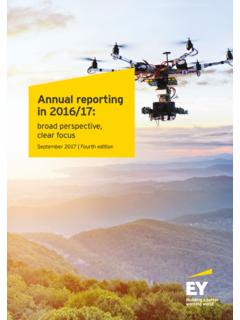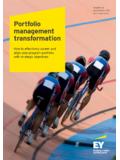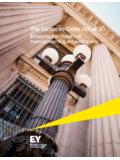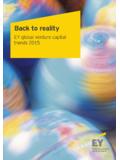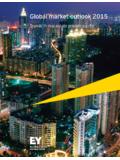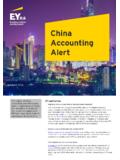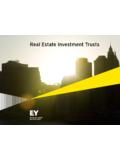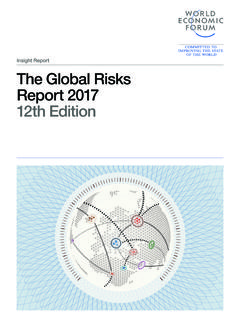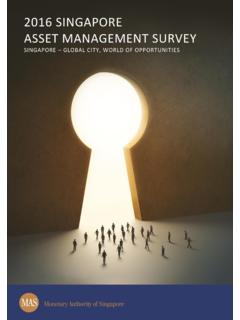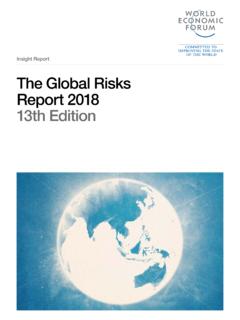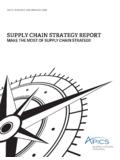Transcription of Is your nonfinancial performance revealing the true …
1 Is your nonfi nancial performance revealing the true value of your business to investors?2017 BExecutive summary 2 Key fi ndings 21. Investors see long-term fi nancial benefi ts in companies with high ESG ratings 32. What motivates companies nonfi nancial reporting? 83. Investors expect COP21 will stimulate ESG reporting 144. Investors demand more from company ESG reports 185. The appeal of ESG analysis in risk management 206. ESG goals and preferences are evolving 22 What next? 26 About this research 28 Contents1Is your nonfi nancial performance revealing the true value of your business to investors?
2 |WelcomeOn behalf of EY, I want to thank you for your interest in our latest report on the linkages between nonfi nancial performance and investor has been said recently about the importance of nonfi nancial performance and in particular disclosures related to environmental, social and governance (ESG) practices of issuer businesses. It has been an eventful year since we last convened this research, with a series of headline-worthy agreements, crises and prominent public statements impacting and informing the dialogue around sustainable business strategy and responsible business practices.
3 There is fertile ground for an updated discussion and evaluation of investor sentiment on these matters. From our research to date, we know that much of the impetus for improved and better integrated nonfi nancial reporting is coming from the institutional investor community. Global policy debates, new regulatory requirements and more stringent supply chain practices undertaken by businesses themselves all play a part, but the collective voice of the investor continues to be among the the crux of our discussion this year is a simple question: is investor appetite for more integrated, predictable and strategic ESG disclosure being met by businesses?
4 Or are we seeing just the opposite? Based on the response to one of our core, recurring questions, the answer may be troubling for those who depend on informed investor decision-making. This year, 60% of respondents said no when asked if companies adequately disclose their ESG risks. That s an increase of more than 20 percentage points over last NelsonEY Global LeaderClimate Change and Sustainability ServicesThe majority of investors surveyed are disappointed by today s disclosures. They often believe disclosures aren t adequately linked to material risks and opportunities, they don t refl ect the full value of businesses, or clearly articulate environmental and social challenges and that reporting would benefi t from being more that as a back-drop, we see signs that constructive change is occurring and new reporting practices are being adopted across industries and geographies.
5 We know organizations such as the International Integrated Reporting Council (IIRC), the Global Reporting Initiative, the Sustainability Accounting Standards Board (SASB) and the Financial Stability Board s Task Force on Climate-related Financial Disclosures are each establishing crucial benchmarks and standards designed to better defi ne what s effective, credible and are thrilled with the forthright responses from more than 320 participants around the world, of which one-third have more than US$10 billion assets under management , and including a number of well-known and infl uential asset managers providing insights on the is a lot at stake here.
6 For EY, this research provides insight into how we play our part in meeting our purpose of building a better working world. How, in this case? Well, by contributing to practices that lead, not only to greater transparency and better constructs for long-term value, but also to fostering a sense that stewardship around the planet s people, resources and environment will be central to how well our world works in the future. 2 Executive summaryEY member fi rms are able to conclude from several years of research of ESG reporting that there is a global trend toward increased interest in nonfi nancial information on the part of investment professionals.
7 But the question we continue to seek to answer is whether ESG information is, ultimately, infl uencing investor decisions. In each of the last three years, research undertaken by EY has documented an expanding role of ESG factors in the decision-making of investors around the headlines refl ect why meaningful ESG analysis is increasingly important for institutional investors and the companies they follow. Larry Fink Wants Companies to Talk More About the Future, declared Bloomberg Media when the head of the world s largest investment manager wrote to the CEOs of public companies to extoll the virtues of strong ESG performance and its effect on valuation.
8 Nearly 200 nations met in Paris to negotiate and sign a global climate agreement that will shift fi nancial markets. And one of the world s largest automakers was embroiled in an unprecedented emissions-testing scandal. These and other news-making events in recent months have propelled ESG to the top of the global agenda. This is despite continued uncertainty in the regulatory environment year s report on ESG and nonfi nancial reporting provides insights into the views of more than 320 institutional investors on nonfi nancial reporting by publicly traded companies and the role ESG analysis plays in their investment decision-making.
9 Investors around the world reveal broad support for the ESG-related themes expressed in the February 2016 memo from Laurence Fink, Chairman and CEO of BlackRock, to the leadership of the world s largest companies. Investors strongly support Fink s call for an annual board-approved strategy statement for public companies. They agree that ESG factors present risks and opportunities that have been neglected for too long. Yes, say investors, sustainable returns require a sharper focus on corporate governance and on environmental and social factors.
10 Disclosure and scrutiny of nonfi nancial information will continue to grow in importance in the years ahead. The Paris Climate Conference agreement will lead to an increase in disclosures about companies climate practices and risk management strategies, say investors. They report that recent environmental and social scandals have driven them to reevaluate nonfi nancial disclosures and look more closely at available nancial performance plays a pivotal role in the investment decisions for most of the surveyed investors, and for a greater percentage of investors than in previous years.
